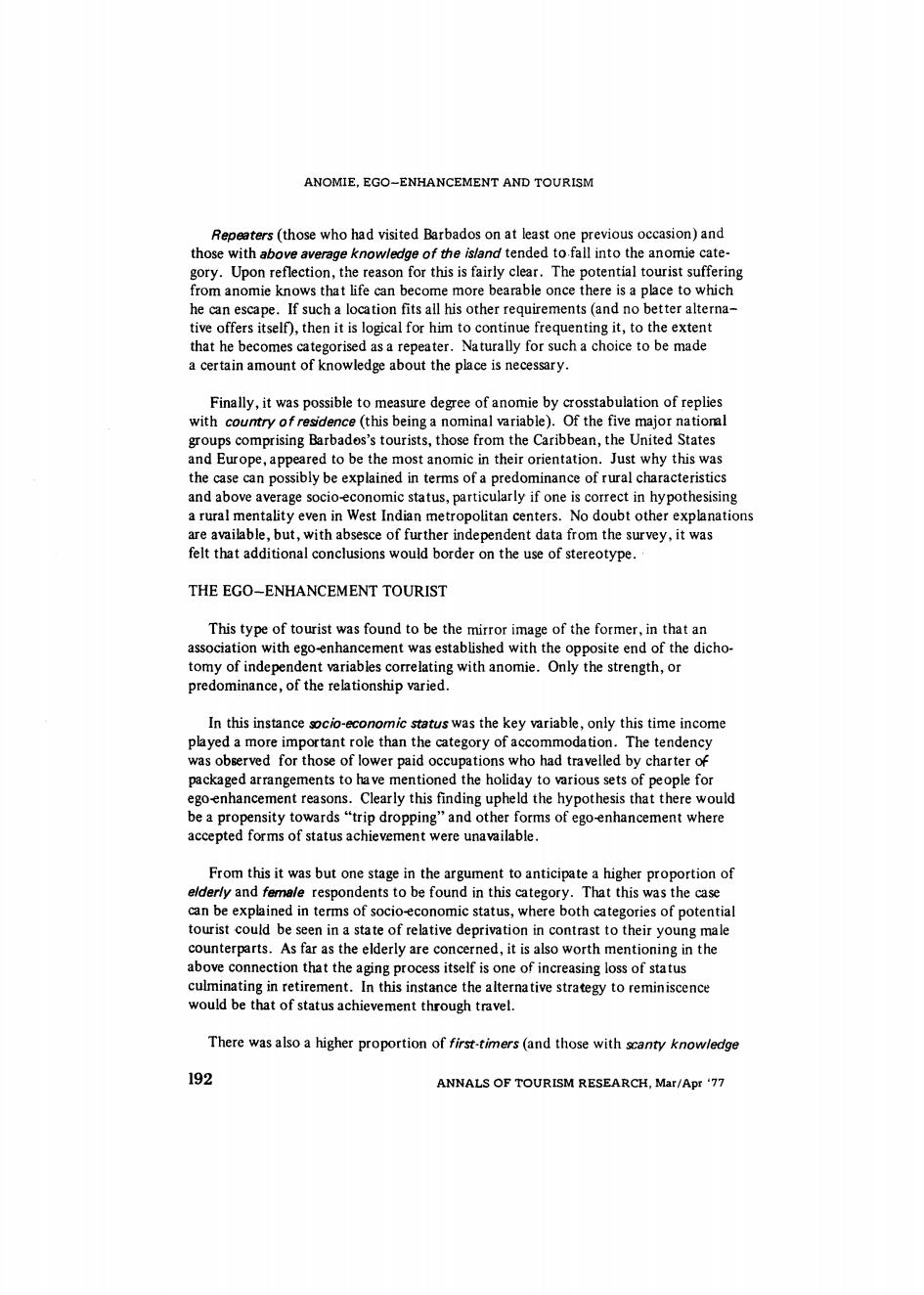正在加载图片...

ANOMIE,EGO-ENHANCEMENT AND TOURISM Repeaters(those who had visited Barbados on at least one previous occasion)and those with above average knowledge of the island tended to.fall into the anomie cate- gory.Upon reflection,the reason for this is fairly clear.The potential tourist suffering from anomie knows that life can become more bearable once there is a place to which he can escape.If such a location fits all his other requirements (and no better alterna- tive offers itself),then it is logical for him to continue frequenting it,to the extent that he becomes categorised as a repeater.Naturally for such a choice to be made a certain amount of knowledge about the place is necessary. Finally,it was possible to measure degree of anomie by crosstabulation of replies with country of residence (this being a nominal variable).Of the five major national groups comprising Barbades's tourists,those from the Caribbean,the United States and Europe,appeared to be the most anomic in their orientation.Just why this was the case can possibly be explained in terms of a predominance of rural characteristics and above average socio-economic status,particularly if one is correct in hypothesising a rural mentality even in West Indian metropolitan centers.No doubt other explanations are available,but,with absesce of further independent data from the survey,it was felt that additional conclusions would border on the use of stereotype. THE EGO-ENHANCEMENT TOURIST This type of tourist was found to be the mirror image of the former,in that an association with ego-enhancement was established with the opposite end of the dicho- tomy of independent variables correlating with anomie.Only the strength,or predominance,of the relationship varied. In this instance socio-economic status was the key variable,only this time income played a more important role than the category of accommodation.The tendency was observed for those of lower paid occupations who had travelled by charter of packaged arrangements to have mentioned the holiday to various sets of people for ego-enhancement reasons.Clearly this finding upheld the hypothesis that there would be a propensity towards"trip dropping"and other forms of ego-enhancement where accepted forms of status achievement were unavailable. From this it was but one stage in the argument to anticipate a higher proportion of elderly and female respondents to be found in this category.That this was the case can be explained in terms of socio-economic status,where both categories of potential tourist could be seen in a state of relative deprivation in contrast to their young male counterparts.As far as the elderly are concerned,it is also worth mentioning in the above connection that the aging process itself is one of increasing loss of status culminating in retirement.In this instance the alternative strategy to reminiscence would be that of status achievement through travel. There was also a higher proportion of first-timers(and those with scanty knowledge 192 ANNALS OF TOURISM RESEARCH,Mar/Apr'77ANOMIE, EGO--ENHANCEMENT AND TOURISM Repeaters (those who had visited Barbados on at least one previous occasion) and those with above average knowledge of the island tended to.fall into the anomie category. Upon reflection, the reason for this is fairly clear. The potential tourist suffering from anomie knows that life can become more bearable once there is a place to which he can escape. If such a location fits all his other requirements (and no better alternative offers itself), then it is logical for him to continue frequenting it, to the extent that he becomes categorised as a repeater. Naturally for such a choice to be made a certain amount of knowledge about the place is necessary. Finally, it was possible to measure degree of anomie by crosstabulation of replies with country ofreddence (this being a nominal variable). Of the five major national groups comprising Barbades's tourists, those from the Caribbean, the United States and Europe, appeared to be the most anomic in their orientation. Just why this was the case can possibly be explained in terms of a predominance of rural characteristics and above average socio-economic status, particularly if one is correct in hypothesising a rural mentality even in West Indian metropolitan centers. No doubt other explanations are available, but, with absesce of further independent data from the survey, it was felt that additional conclusions would border on the use of stereotype. THE EGO-ENHANCEMENT TOURIST This type of tourist was found to be the mirror image of the former, in that an association with ego-enhancement was established with the opposite end of the dichotomy of independent variables correlating with anomie. Only the strength, or predominance, of the relationship varied. In this instance socio-economic status was the key variable, only this time income played a more important role than the category of accommodation. The tendency was observed for those of lower paid occupations who had travelled by charter oF packaged arrangements to have mentioned the holiday to various sets of people for ego-enhancement reasons. Clearly this finding upheld the hypothesis that there would be a propensity towards "trip dropping" and other forms of ego-enhancement where accepted forms of status achievement were unavailable. From this it was but one stage in the argument to anticipate a higher proportion of elderly and f~nale respondents to be found in this category. That this was the case can be explained in terms of socio-economic status, where both categories of potential tourist .could be seen in a state of relative deprivation in contrast to their young male counterparts. As far as the elderly are concerned, it is also worth mentioning in the above connection that the aging process itself is one of increasing loss of status culminating in retirement. In this instance the alternative strategy to reminiscence would be that of status achievement through travel. There was also a higher proportion of first-timers (and those with scanty knowledge 192 ANNALS OF TOURISM RESEARCH, Mar/Apr '77